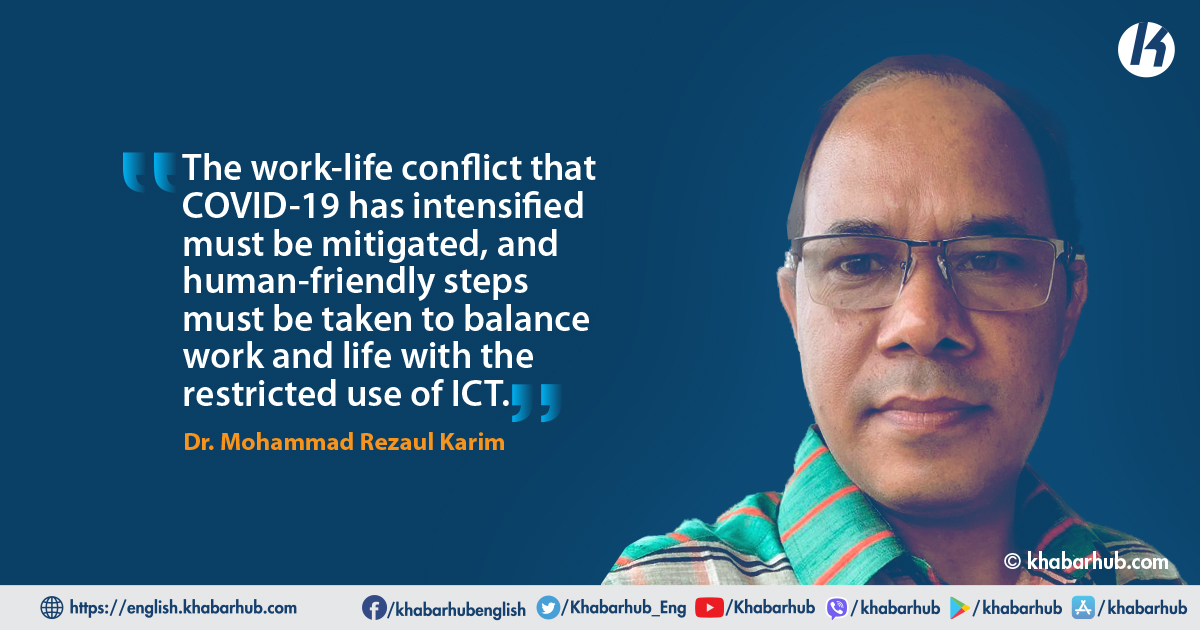Restrictions on movements and closure of offices during COVID-19 forced people to remain confined at home. This along with ample free time made many get accustomed to the Internet in an unprecedented way.
When almost every business derailed, Information and Communication Technology (ICT) saw an exponential increase in usage.
The Internet has been a blessing during this time to get official work done at home. Apart from office work, people are accustomed to doing day-to-day activities including ordering food, buying necessary items online, connecting with friends and family members virtually.
A researcher commented that when a fish gets caught in a net, it curses its luck and tries to free itself from mesh whereas people volunteers to get caught in a net and seemingly they enjoy this entrapment. It is significantly evident during the pandemic.
E-government is the use of information communication devices and software to render service. ICT comprises both hardware (computer, mobile, Intranet and Internet infrastructure, modem and server) and software (various apps, online platform and social media).
Is the use of ICT leading to work-life balance or conflict? Work-life balance amounts to spending more quality time with the family, emphasizing family bonding.
Although ICT-induced devices helped people spend time, this eventually came to dominate people’s lives. Information Technology (IT) has captured every aspect of human life — from personal to professional.
The dramatic rise of IT has brought tremendous benefits to human life. It has changed the working process, service delivery and even thinking capacity.
Social media dramatically reduces social linkages. Expression of love has been replaced by emojis. People’s reliance on the Internet and social media apps for commutation continues even as the severity of COVID-19 abates.
Modern life without IT seems disabled. COVID-19 has pushed companies to transform business forever with greater use of ICT in all processes and procedures.
Thus, companies, especially the IT sector across the world did the record business during the pandemic even after a declining profit in all business sectors. It is obviously a setback to administrative culture, decision-making process and service delivery system.
Until a few years back, having a telephone or mobile, computer, printer, Wi-Fi password and email was a notion of entitlement and social dignity.
Even a telephone at residence or mobile with sufficient talk time brought happiness. In spite of having pronounced benefits, the use of ICT produces unintended and unwelcome consequences including IT-based cultural domination, new colonization, technological slavery, attacks on privacy, a hindrance to personal safety, insecurity, family conflict, mental pressure, health hazards, and hindrance to creative thinking.
It was believed that movement restriction and confinement in the room may have possible positive benefits for the family bonding, quality time for children from parents, especially working parents, full-time staying at home created unintended consequences and adversely affected family life.
Children are the biggest losers because of excessive use of ICT as it hits the urge to study. Because of the prolonged closure and uncertainty of reopening of educational institutes, parents allowed their children to use electronic devices, mobile in particular.
Although it was an instrument of passing time primarily of children, they become addicted. Parents who allowed them to use ICT tools later realize the negative side of these devices. Thus, ICT, especially during the pandemic, expedited work-life conflict.
After stipulated office time, office work is carried home with the digital device. If the phone rings or a message comes through social media or cell phone, the user becomes restless until the issue has been addressed.
Messages from senior officials change behavior, at times leading to unpleasantness with family members.
The use of IT increases expenditure but decreases the quality time for family members and family activities. The use of ICT and multiple devices turn life to 24/7 office through all seasons. The pandemic has extended the work hours, hampering personal time.
Children are annoyed at times by the excessive use of the Internet by parents too. Office work even moves from one’s home to another’s.
Recognizing the negative consequences, developed countries have already issued restrictions over calling and sending email after office time, compulsory leave for those with families, shortening office time, and introducing Wednesday holidays to enjoy life better.
Invited guests ask for Wi-Fi password after entering the house and start working on urgent official business or attending social media.
Social media dramatically reduces social linkages. Expression of love has been replaced by emojis. People’s reliance on the Internet and social media apps for commutation continues even as the severity of COVID-19 abates.
Technology has inherent problems. IT infrastructure requires uninterrupted electricity supply, better Internet bandwidth and effective software.
Interruption between calls or social media keeps individuals busy until the connection is restored. Social media makes the user look repeatedly for the number of likes and reactions by viewers.
The long working hour that extended during the COVID-19 pandemic has led to high blood pressure, insomnia, mental disorders, fatigue, and boredom and the use of ICT intensifies occupational health hazards.
Technological domination by developed nations emerges as the new form of colonization as developing countries are the markets of those continuously changing IT products, new software and expert personnel. Developing countries struggle to keep pace with the faster speed of technologically advanced countries.
Adaptation with new devices creates pressure on official activities and the feeling of technical domination creates psychological pressure on the human being.
Thus, people in the modern world are chained and turned into a technological slave. Due to the increasing use of ICT, the higher the position in office hierarchy is, the higher the work-life conflict face.
The use of ICT turns a man into a mechanical being; citizens transform to Netizens, humans become I-humans.
Recognizing the negative consequences, developed countries have already issued restrictions over calling and sending email after office time, compulsory leave for those with families, shortening office time, and introducing Wednesday holidays to enjoy life better.
The work-life conflict that COVID-19 has intensified must be mitigated, and human-friendly steps must be taken to balance work and life with the restricted use of ICT.









Comment